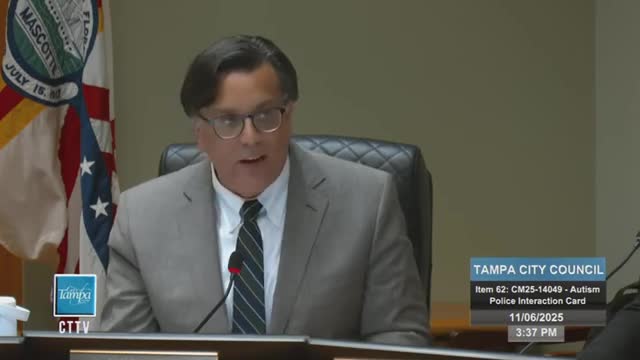Council backs 'blue envelope' idea to help drivers with disabilities communicate during traffic stops
Get AI-powered insights, summaries, and transcripts
Subscribe
Summary
After a short presentation by an intern in the city’s disability internship program and the ADA coordinator, council directed staff to prepare an in‑person report and rollout plan for a voluntary 'blue envelope' vehicle notification for people with disabilities; staff and public safety partners will coordinate training and regional alignment.
Council unanimously directed staff to develop and return with an in‑person staff report on a voluntary "blue envelope" program that people with disabilities could keep with vehicle registration to notify officers during a stop or accident.
Eric Kaiser, a 31‑year‑old participant in a city internship program for people on the autism spectrum, described a personal example in which a simple, pre‑prepared envelope reduced anxiety during a traffic incident. "It was just kind of like, ‘Hold on a second, I have a blue envelope,'" Kaiser said during his remarks; he asked council to support wider use and training for the tool.
Raquel Pancho, the city’s Americans with Disabilities Act coordinator, briefed council on existing resources including the Tampa Police Department’s voluntary Help Us Help You special‑needs registry (in use since 2018), which now allows vehicle registration to be added. Pancho and TPD staff said several third‑party wallet‑card programs exist nationally but charge fees; the "blue envelope" model keeps information in the glove box next to vehicle papers and is free and straightforward for drivers and officers.
Council members praised the idea. "This is preventive of something that could happen that could be much more tragic," Councilman Viera said, urging the city to move forward. Councilman Escalco and others described personal family experience with autism and supported an expanded, regional approach. Council moved and unanimously approved a staff report request; the motion specifically asked for an in‑person staff report and asked Eric to participate as an ambassador in April (Autism Awareness Month).
Why it matters: The program is voluntary, low‑cost and intended to reduce stress and miscommunication during vehicle stops and accidents for people with communication differences, cognitive disabilities or sensory processing needs. Council also directed staff to coordinate with regional public‑safety partners to keep the approach consistent across jurisdictions.
Next steps: Staff will return with an in‑person report including model materials, proposed training for officers, outreach plans and any necessary operational guidance.
Provenance: Presentation and council motion occurred during the public business portion of the Nov. 8 meeting; staff and council set follow‑up actions for spring 2026.
